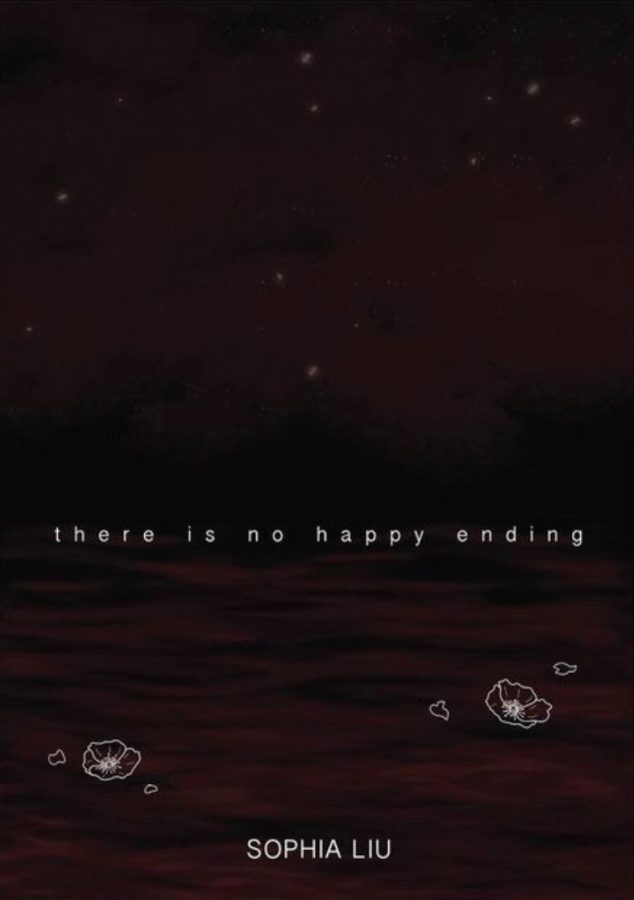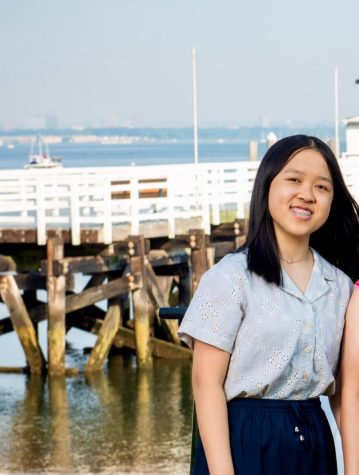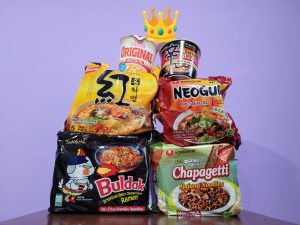A Rewording Journey
March 25, 2023
Sophia Liu, a senior at South High School, is the author of the poetry collection There Is No Happy Ending (New Rivers Press 2023). Her work appears or is forthcoming in Frontier Poetry, Puerto del Sol, AAWW: The Margins, Muzzle Magazine, DIALOGIST, Superstition Review, and elsewhere. In this article, she talks about her journey as a young writer, the process of publishing a chapbook, and the advice she would give to emerging creatives.
What sparked your interest in the poetry genre?
SL: The summer before eighth grade, I attended the Johns Hopkins CTY Program at Franklin & Marshall College, where I was introduced to poetry, specifically contemporary poetry, which I consider anything written in the 21st or late-20th century or by a poet who’s currently alive. I had no idea that this entire world existed because I was never introduced to a lot of poetry in middle school.
Previously, I was writing primarily prose. The program motivated me to write poems, and in eighth grade, I started writing poetry outside of class.
What inspires you as a writer?
SL: I’m very inspired by experimental poetry, especially poetry that incorporates visual elements or plays with form. Many contemporary poets like Terrance Hayes and torrin a. greathouse have taken poetic forms like the sonnet and the haibun and reinvented/subverted it to make it their own. They’ve inspired me to view poetry as this boundless entity that is political.
Poetry is inherently political when you subvert form, especially when you subvert Western form that has been dominated and wielded by white men. As a person of color, as a person who has been historically marginalized, when you choose to defy expectations, choose to invent artistically, choose to not listen to established traditions, you shatter stereotypes and advocate for yourself and your community.
But in a general sense, I’m inspired by almost anything. I once wrote a poem about finding love in your SAT testing center (I did not). Poetry doesn’t always have to be so serious, and I like to find humor and wonder in the mundane.
What motivates you to write with endurance?
SL: Poetry and language have saved my life. Writing and reading are places of sanctuary and healing and have allowed me to better understand a world that oftentimes feels inundated with violence. I just read a poem yesterday by Gabrielle Calvocoressi titled “Hammond B3 Organ Cistern,” and it was so beautiful. It’s full of longing for love, compassion, and empathy. Words are beautiful; words by other writers have meant so much to me, and I want my words to mean a lot to other people.
Are there any writers that have been a source of inspiration for you?
SL: Ocean Vuong, Mary Oliver, Paisley Rekdal, Claudia Rankine, Jenny Zhang, Solmaz Sharif, Alex Dimitrov, Aria Aber, and so many others.
Publishing a Chapbook
How did the poems in your chapbook come about?
SL: My writing took off during the pandemic, around the end of 9th and beginning of 10th grade. I was reading and writing frequently, and I saw my writing improve. The summer after 10th grade [2021], I attended Iowa Young Writers’ Studio and the Adroit Mentorship Program. These two programs, along with my independent reading, really spurred me to see poetry as an active agent of social change. I was deeply moved by [the poetry I was reading] since a lot of it was political.
[At the same time], I was reflecting on events that occurred [during] the pandemic, particularly the skyrocketing of Asian hate crimes and police brutality. I think that living in New York, especially in Great Neck, is not representative of living in the wider United States due to the large populations of Asians and other minority communities. In my middle school years, I had never experienced acts of blatant racism.
When I saw Michelle Alyssa Go and Vicha Ratanapakdee die, [it spurred me] to research Asian American history, and finally, so much of my parents’ worldview and my experiences started to make sense. I understood the myth of white-Asian equivalence [the myth downplays the issue of racism faced by Asian Americans by creating a false narrative that Asians face less/no systemic racism and discrimination because on the surface, Asian Americans have been able to achieve similar socioeconomic success as white people. However, when the Asian American community is broken down into its respective ethnic groups, the statistics reveal that Asian Americans are far from reaching the same socioeconomic status as white people.].
I think the pandemic illuminated and exacerbated America’s socioeconomic and racial inequality. I was reading and writing a lot of poetry about social injustice and identity politics, and by the end of the summer, I had written a handful of poems about the same topic. I was like, ‘Oh, this could be a chapbook. Why don’t I put it into a manuscript and try to submit it to places?’
What was the process of finding someone to publish your book?
SL: Publishing a chapbook is very similar to publishing an individual poem. You submit it to places and hope the editors of the press or journal accept your work. The only thing is that to have a chapbook press read your work, since they are more involved than a journal, you’d likely have to pay a fee or roughly $10 to $20. I started submitting my chapbook to presses in October 2021 and continued until July 2022.
I remember it was September 2022, and I was in Starbucks. I checked my phone and saw that my manuscript had won the New Rivers Press Chapbook Contest.
Who accepted your manuscript and what were the next steps in the publishing process?
SL: New Rivers Press accepted my manuscript. I had to fill out a bunch of forms, give them a headshot, and do other technical stuff. Then, we had to edit. The press is run by MFA students and faculty, so they made edits, and then I responded, and then they made some more and I responded. I’m very thankful for the kindness and patience Nayt Rundquist, the Managing Editor, as well as all the students have treated me with.
Where can people buy a copy of the chapbook?
SL: The book will be available on New Rivers Press’ website.
How would you describe the content of your book?
SL: The book responds to and examines the social injustice happening in America and in China. The book includes 13 poems that assume a variety of experimental and more traditional forms. Two poems contain original drawings and photographs, which I’m super excited about.
What have you gained through this journey of publishing a chapbook?
SL: At certain points, I definitely felt that the book was not going to happen because it was rejected around eight times. Especially since I was spending money to pay for submission fees, at some point, [I felt] it would be better to stop trying. But I stuck to it. And eventually, my manuscript did get accepted. So I’ve learned to have trust and hope. But I think even if the book wasn’t going to be published, I still wrote it, and I’d still be proud of my work. It’s important to feel proud of yourself and what you’ve accomplished without needing external validation.
I want to acknowledge my privilege in having the opportunity to attend programs outside of school and in having teachers and mentors who have supported and influenced my writing. I think that without these opportunities, my writing would have not grown as much as it did, and I would not have known how to navigate the literary sphere. This book is ultimately the product of my parents’ sacrifices in giving me the privilege to pursue my dreams.
Do you have any future goals for yourself as a writer?
SL: I’m trying to write for myself more. I’ve recently been diving more into creative nonfiction and personal essay writing. I want to more consistently write, [and] I hope to publish a full-length collection in my 20s or 30s, but there’s no rush. I think it’s always more crucial to prioritize the quality and longevity of your work rather than the quantity of it.
Advice for Teen Writers
You’ve been published in many places. Can you talk about your experience and dealing with rejection?
SL: It’s very difficult. At first, if you let the rejections get to you, you can really spiral out and it can damage your self-worth and motivation to write. But then you get rejected a lot, and you learn that rejections are not indicators of the quality of your work. You have to get used to it. I think by now, I’ve probably been rejected close to 300 times.
I really dislike the pressure placed on young writers to constantly publish. Being able to produce good work and being focused on your craft outweighs any publication or honor. Concentrate on the quality of your work and your growth as a creative; the publishing comes later.
As an editor, I’ve also come to understand that rejections are not personal. I’ve probably sent out hundreds of rejection emails at this point myself, and it’s never out of harm to the writer. Sometimes, it really hurts me to say no to a poem because I simply don’t have space to put it in the issue or because it just doesn’t fit the theme.
What advice would you give to someone who is starting in their writing journey and to someone who hopes to begin publishing their writing?
SL: I would say the most important thing is to write for yourself. Don’t write for merit, don’t write for publication, don’t write for external validation. Whatever you do, you should do it because you love it.
Writing is very competitive, but that doesn’t mean it has to be approached like a competitive sport. Just because a poem wins a contest doesn’t make it “better” than other poems or the poet more capable than other poets. Take care of your work and of yourself.








